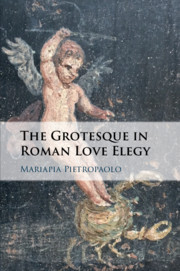Book contents
- The Grotesque in Roman Love Elegy
- The Grotesque in Roman Love Elegy
- Copyright page
- Dedication
- Contents
- Preface
- Acknowledgements
- Abbreviations
- Chapter 1 Premises and Expectations of the Elegiac Grotesque
- Chapter 2 Context and Prehistory of the Elegiac Grotesque
- Chapter 3 Cynthia and the Grotesque Ethos
- Chapter 4 The Ovidian Unmasking of the Elegiac Grotesque
- Chapter 5 Revolting and Refined: The Aesthetic Function of Acanthis
- Chapter 6 Grotesque Hermeneutics of the Lena in Tibullus and Ovid
- Chapter 7 The Rival: A Vir Foedus
- Chapter 8 Pasiphae and the Allurement of the Grotesque
- Chapter 9 Ovid’s Remedia and the Waning of the Elegiac Grotesque
- References
- Index
Chapter 3 - Cynthia and the Grotesque Ethos
Published online by Cambridge University Press: 10 September 2020
- The Grotesque in Roman Love Elegy
- The Grotesque in Roman Love Elegy
- Copyright page
- Dedication
- Contents
- Preface
- Acknowledgements
- Abbreviations
- Chapter 1 Premises and Expectations of the Elegiac Grotesque
- Chapter 2 Context and Prehistory of the Elegiac Grotesque
- Chapter 3 Cynthia and the Grotesque Ethos
- Chapter 4 The Ovidian Unmasking of the Elegiac Grotesque
- Chapter 5 Revolting and Refined: The Aesthetic Function of Acanthis
- Chapter 6 Grotesque Hermeneutics of the Lena in Tibullus and Ovid
- Chapter 7 The Rival: A Vir Foedus
- Chapter 8 Pasiphae and the Allurement of the Grotesque
- Chapter 9 Ovid’s Remedia and the Waning of the Elegiac Grotesque
- References
- Index
Summary
In Propertius 4.7, Cynthia is conceived as the character who, in her role as the beloved, can infuse a sinister sensation of the grotesque into the very concept of elegiac love, of which she is the source and the protagonist. The poet ventriloquizes her voice, superimposing her role and gender identity on his, in a strategy that enables him to transmit to the realm of his aesthetic choices her grotesque embodiment of elegy, as well as her allegation that, in charging her with infidelity, he was not truthful about her. In this poem, Propertius’ elegiac programme appears to be centrally committed to a grotesque ethos, derisive and destabilizing of the epistemological and aesthetic conventions by which the genre is presumed to be governed. As a result, the conceptual and aesthetic domains of the genre appear deeply marked by uncanny imagery, contradiction, and instability of form. The imaginative world of this elegy requires readers to shift their interpretive base continually, accepting the incongruous realm of beauty pierced by ugliness as the manifestation of a poetic congruity of a higher order. That dialectical form of congruity is the distinctive feature of the Propertian elegiac grotesque.
- Type
- Chapter
- Information
- The Grotesque in Roman Love Elegy , pp. 59 - 81Publisher: Cambridge University PressPrint publication year: 2020

